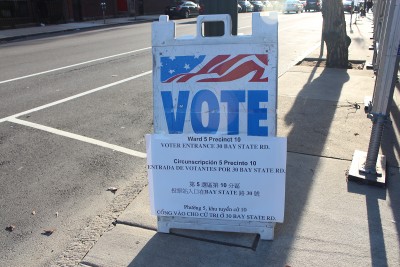
Massachusetts residents voted for their choice of presidential candidate during the primary election on Super Tuesday, and several Boston University students said they believed they were informed enough about this election’s cycle and would therefore vote to fulfill their civic responsibility.
The American youth is known for its reluctance to vote — only 38.9 percent of eligible voters aged 18 to 29 voted during the 2012 presidential election, according to an infographic from the Center for Information and Research on Civic Learning and Engagement at Tufts University. The Massachusetts voter turnout for that same age group was 43.8 percent, the infographic showed.
Virginia Sapiro, a political science professor in the College of Arts and Sciences, noted that college-aged Democrats are more likely to support Vermont Sen. Bernie Sanders in this election cycle, but she was not sure if students would be more likely to vote as a result.
“[Sanders] has done a good job of mobilizing activism among those students, emphasizing holding rallies and other events on campus and even employing a music director to pick music that will specifically appeal to young people and students,” Sapiro wrote in an email. “Whether they will be more likely to vote than in other years in the primary is unclear.”
Though Sanders is popular among younger generations, Sapiro claimed saying college students support him because he is “very liberal” would be imprecise.
“It is important to understand that college students are a very diverse group of people nationally, reflecting their regions, backgrounds, and other things,” Sapiro wrote. “Young people in the Democratic party turned out very heavily for Barack Obama in 2008. It should be heavier turnout among those kinds of young voters than usual, though.”
Eighty-three percent of voters aged 18 to 29 reported that they learn about the election from at least one source, according to a Pew Research Center analysis released Feb. 4. Of these voters, 35 percent use social media, 18 percent use news websites or applications and 12 percent use cable television.
Several students voted Tuesday at the polling station at Myles Standish Hall, the same day as more than a dozen states. A candidate who performs well on Super Tuesday is likely to secure each party’s nomination.
Rebecca Roberts, a freshman in CAS, said she decided to vote because she saw so much about the election on social media and finally understood that her vote would mean something.
“After the amount of people on social media saying, ‘Please vote, please vote,’ I realized it makes a difference because I’m a college student now,” Roberts said. “This is actually the first year I’m allowed to vote, so I might as well take advantage of it.”
Gabriela Velasquez, a second-year graduate student in the School of Public Health, said that she would vote so her voice could be heard and she could support her candidate of choice.
“Given the political landscape, especially in the Republican Party, it’s important to at least begin the voting process whether it’s in the primaries or in the general election and making your voice heard,” Velasquez said. “I’m also passionate about a candidate, and I want to make sure that my vote is counted for that candidate.”
Joseph Yeb, a freshman in the College of General Studies, said he voted in support of Sanders.
“I really support Sanders and I want to see him become president,” Yeb said. “It’s really important for the youth to come out and vote. I would say Sanders, as a politician, really did motivate me to come out here.”
Yasmin Gentry, a senior in the College of Communication said voting is a fundamental part of her civic duty as a U.S. citizen.
“I’m really grateful for the opportunity, that it’s something that we get as citizens of the United States of America,” Gentry said. “It may not be our constitutional duty, but it’s our duty as citizens. I’m really proud to be an active community member, and this is a way that I can express my opinions.”
Shealyn Lonergan, however, said she did not plan on voting in the primary election because she did not have enough knowledge to make an informed decision.
“Honestly, I’m not that involved in politics, so I don’t think if I were to vote today, it would be an informed vote,” Lonergan, a senior in the CAS, said. “I do plan on voting in the national election. I just need to take the time and actually gain more information and learn about the candidates more.”



















































































































